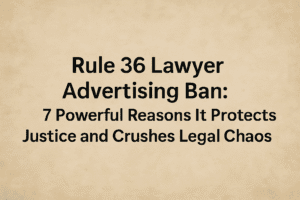Rule 36 Lawyer Advertising Ban: 7 Powerful Reasons It Protects Justice and Crushes Legal Chaos
Rule 36 of India’s Bar Council Rules remains vital in the digital age because it protects the constitutional essence of legal practice. Unlike commercial professions, lawyers serve as officers of the court with fiduciary duties that transcend transactional relationships. The rule prevents commodification by banning direct and algorithmic solicitation – as affirmed when courts struck down platforms like JustDial for enabling “structured client matchmaking.”
Critiques misread the prohibition; lawyers may freely share knowledge through articles or websites, provided they avoid promotional hooks. Comparisons to medical or accounting fields fail because legal advocacy uniquely impacts liberty and justice under India’s constitutional framework. While digital tools enhance accessibility, Rule 36 ensures technology serves ethics rather than transforming justice into e-commerce. This safeguards public trust by prioritizing the sanctity of legal service over marketplace visibility.

Rule 36 Lawyer Advertising Ban: 7 Powerful Reasons It Protects Justice and Crushes Legal Chaos
In an era where Instagram influencers promote court victories and algorithms match clients to attorneys, India’s legal profession stands apart. Rule 36 of the Bar Council of India (BCI) Rules—often criticized as archaic—remains a defiant safeguard against turning justice into a commodity. But why does this 1961-era rule still matter in digital India? The answer lies in the soul of the profession itself.
The Core Conflict: Officers of the Court vs. Service Providers
Rule 36 prohibits lawyers from advertising, soliciting work, or using media to tout successes. Critics argue this stifles visibility in a digital world. Yet the rule’s intent is profound:
- Lawyers ≠ Vendors: Unlike consultants or doctors, advocates are constitutionally recognized as “officers of the court” (Entries 77-78, Union List). Their duty transcends client service—it upholds the integrity of justice.
- The Fiduciary Firewall: In Bar of Indian Lawyers v. DK Gandhi (2023), the Supreme Court ruled that lawyer-client relationships are fiduciary, not transactional. Allowing SEO-driven competition risks eroding this trust.
Digital Loopholes & Algorithmic Ethics
Recent cases expose how tech platforms test Rule 36’s boundaries:
- Sites like “Vakil Vetted” or “JustDial” use backend algorithms to match clients with lawyers. The 2024 PN Vignesh v. BCI verdict deemed this “structured solicitation”—violating Rule 36 regardless of public visibility.
- The Illusion of Neutrality: Search filters (e.g., “top divorce lawyer Delhi”) commodify skills, incentivizing lawyers to prioritize visibility over virtue.
Why Medicine & Accounting Aren’t Valid Comparisons
Reform advocates often cite other professions’ advertising freedoms. This overlooks key distinctions:
| Profession | Advertising Freedom | Ethical Guardrails |
| Medicine | Limited factual details | Banned: Testimonials, outcome claims |
| Chartered Accountancy | Near-total ad ban (ICAI rules) | Zero tolerance for promotion |
| Legal Practice | Constitutional role | Rule 36 preserves impartiality |
| Unlike management consultants, lawyers wield state-sanctioned power over liberty and property. Treating them as commercial actors risks reducing justice to a paid privilege. |
Knowledge Sharing vs. Client Hunting: Walking the Tightrope
Rule 36 doesn’t silence lawyers—it redirects their voice:
✅ Permitted: Academic articles, social commentary, pro bono webinars.
❌ Forbidden: “Contact me” links under case analyses; “expertise rankings.”
The test? Intent. An article on arbitration reform is education; adding a “Hire Me” button makes it solicitation.
The Unspoken Cost of Repeal
Weakening Rule 36 wouldn’t just change marketing—it would redefine advocacy:
- The Bias Risk: Lawyers might prioritize media-friendly cases over morally urgent ones.
- The Trust Erosion: When legal aid becomes a “product,” public faith in courts diminishes.
As the Madras High Court warned: “Structured discovery is structured solicitation.”
Conclusion: Progress Without Poison Pills
Digital tools can uplift India’s legal ecosystem—think virtual libraries or AI-assisted research. But client acquisition platforms masquerading as “innovation” threaten the profession’s soul. Rule 36 isn’t anti-technology; it’s anti-trivialization. In preserving the line between service and solicitation, it ensures lawyers serve justice, not market share.
“The law is not a marketplace. It is the temple guard of democracy.”
You must be logged in to post a comment.